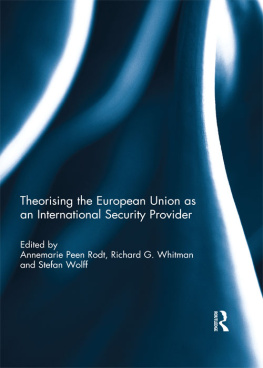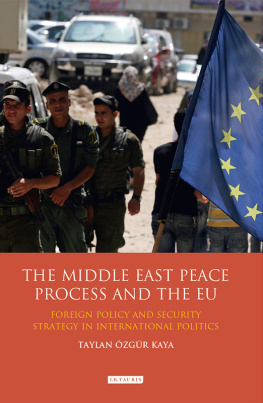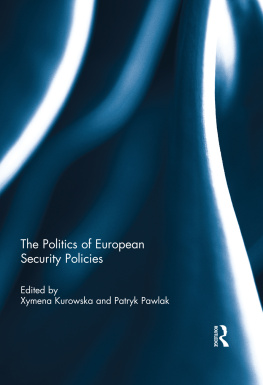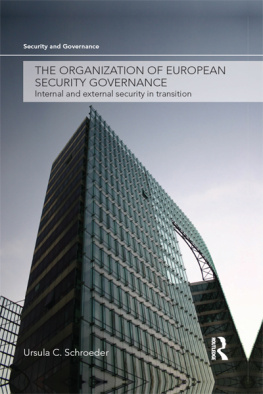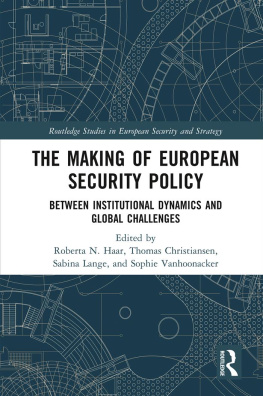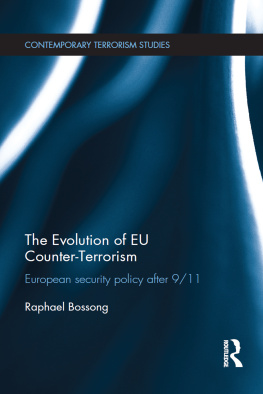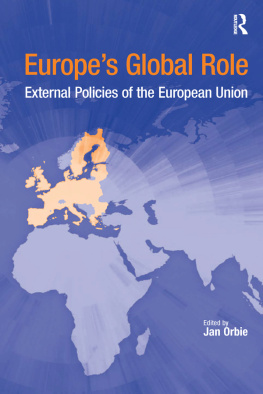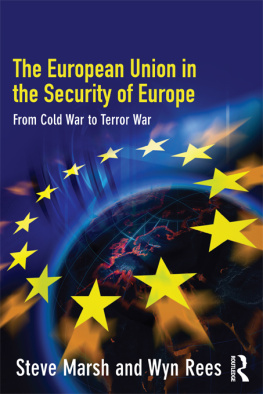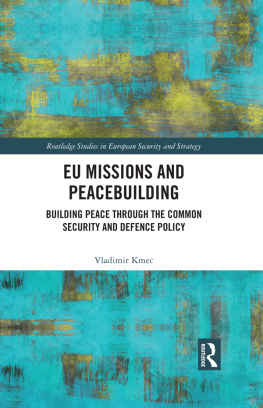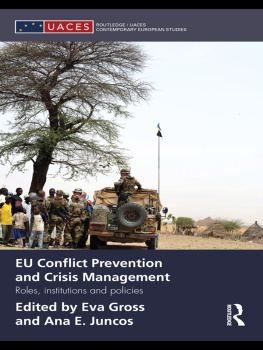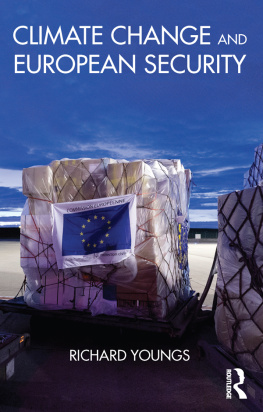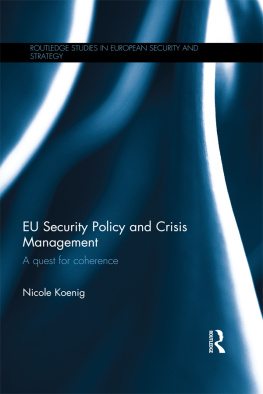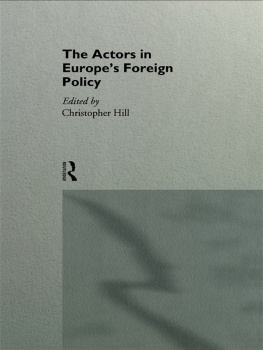Theorising the European Union as an International Security Provider
The European Union has increasingly taken on a role as international security provider that extends beyond the geographical scope of its membership. This is clear from the wide range of military and civilian crisis management missions that the Union has undertaken, but also identifiable through its other policies, such as the European Neighbourhood Policy and development assistance, which have also to some extent become security focused. Yet, the role of the EU as an international security provider remains under-theorized and weakly understood.
This book analyses the Unions role as an international security provider in a comprehensive way, developing theoretical as well as empirical grounding for the understanding of the making and implementation of EU security policy. The contributions in this book cover actors involved in the policy making process, the dynamics of this process itself, its outcomes (strategies and policies) and their impact on the ground. They examine the relevance of, and apply existing theories of international relations, international security and foreign policy analysis to the specific case of the EU, investigate empirically how particular policies are formulated and implemented, and study the impact and effectiveness of the Union as an international security provider in a variety of cases compared.
This book was previously published as a special issue of Global Society.
Annemarie Peen Rodt is Associate Professor at the Royal Danish Defence College, Denmark. Her research focuses on EU and Security Provision, and current projects include Improving Effectiveness of Capabilities in EU Conflict Prevention, and Preventing and Responding to Conflict: Developing EU Civilian Capabilities. Associate Professor Rodt is author of European Union and Military Conflict Management (Routledge, 2014), and, with Stefan Wolff, Self-determination after Kosovo, in Europe-Asia Studies.
Richard G. Whitman is Professor of Politics and International Relations and Director of the Global Europe Centre, University of Kent, UK. He is an Associate Fellow of Chatham House. His current research interests include external relations and foreign, security and defence policies of the European Union, as well as its governance and future priorities.
Stefan Wolff is Professor of International Security and Director of Research and Knowledge Transfer in the College of Social Sciences at the University of Birmingham, UK. He is an expert on international crisis management and post-conflict state-building and has been engaged in conflict settlement negotiations in Moldova, Iraq, Sudan and Yemen.
Theorising the European Union as an International Security Provider
Edited by
Annemarie Peen Rodt, Richard G. Whitman and Stefan Wolff
First published 2016
by Routledge
2 Park Square, Milton Park, Abingdon, Oxon, OX14 4RN, UK
and by Routledge
711 Third Avenue, New York, NY 10017, USA
Routledge is an imprint of the Taylor & Francis Group, an informa business
2016 University of Kent
All rights reserved. No part of this book may be reprinted or reproduced or utilised in any form or by any electronic, mechanical, or other means, now known or hereafter invented, including photocopying and recording, or in any information storage or retrieval system, without permission in writing from the publishers.
Trademark notice: Product or corporate names may be trademarks or registered trademarks, and are used only for identification and explanation without intent to infringe.
British Library Cataloguing in Publication Data
A catalogue record for this book is available from the British Library
ISBN 13: 978-1-138-65966-7
Typeset in Palatino
by RefineCatch Limited, Bungay, Suffolk
Publishers Note
The publisher accepts responsibility for any inconsistencies that may have arisen during the conversion of this book from journal articles to book chapters, namely the possible inclusion of journal terminology.
Disclaimer
Every effort has been made to contact copyright holders for their permission to reprint material in this book. The publishers would be grateful to hear from any copyright holder who is not here acknowledged and will undertake to rectify any errors or omissions in future editions of this book.
Contents
Annemarie Peen Rodt, Richard G. Whitman and Stefan Wolff
Alistair J.K. Shepherd
Benjamin Pohl and Niels van Willigen
Argyro Kartsonaki and Stefan Wolff
Gorm Rye Olsen
Jan Orbie and Karen Del Biondo
Laura Davis
The chapters in this book were originally published in Global Society, volume 29, issue 2 (April 2015). When citing this material, please use the original page numbering for each article, as follows:
Chapter 1
The EU as an International Security Provider: The Need for a Mid-range Theory
Annemarie Peen Rodt, Richard G. Whitman and Stefan Wolff
Global Society, volume 29, issue 2 (April 2015) pp. 149155
Chapter 2
The European Security Continuum and the EU as an International Security Provider
Alistair J.K. Shepherd
Global Society, volume 29, issue 2 (April 2015) pp. 156174
Chapter 3
Analytic Eclecticism and EU Foreign Policy (In)action
Benjamin Pohl and Niels van Willigen
Global Society, volume 29, issue 2 (April 2015) pp. 175198
Chapter 4
The EUs Responses to Conflicts in its Wider Neighbourhood: Human or European Security?
Argyro Kartsonaki and Stefan Wolff
Global Society, volume 29, issue 2 (April 2015) pp. 199226
Chapter 5
After Afghanistan: The European Union as Security Provider in Africa
Gorm Rye Olsen
Global Society, volume 29, issue 2 (April 2015) pp. 227242
Chapter 6
The European Unions Comprehensive Approach in Chad: Securitisation and/or Compartmentalisation?
Jan Orbie and Karen Del Biondo
Global Society, volume 29, issue 2 (April 2015) pp. 243259
Chapter 7
Reform or Business as Usual? EU Security Provision in Complex Contexts: Mali
Laura Davis
Global Society, volume 29, issue 2 (April 2015) pp. 260279
For any permission-related enquiries please visit:
http://www.tandfonline.com/page/help/permissions
Laura Davis is a scholar and practitioner specialised in transitional justice and peacemaking with extensive experience in sub-Saharan Africa. She advises government agencies and NGOs and writes extensively for academic and policy audiences. Her publications include EU Foreign Policy, Transitional Justice and Mediation: Principles, Policy and Practice (Routledge, 2014), the first scholarly assessment of EU engagement in these fields. She is a Postdoctoral Researcher associated with the Centre for EU Studies at the University of Ghent, the Netherlands.
Karen Del Biondo obtained her PhD at the Centre for EU Studies in September 2012 with a dissertation on EU democracy promotion in sub-Saharan Africa. Her research focuses on EU and US policies on democracy promotion, conflict prevention and development cooperation in Africa. She was a Postdoctoral Fellow at the Center on Development and the Rule of Law, Stanford University, USA, and the Freie Universitt Berlin, Germany. She currently works for GIZ on an anti-corruption project in Malawi. Her publications have appeared in the

